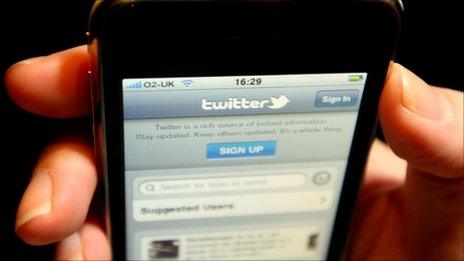Could Twitter become a threat to the justice system?
- Published
- comments

Twitter can be used in court now but where will it all end?
During the row over privacy injunctions, critics have emphasised that it is near impossible to stop people revealing information on Twitter. But what if people use it to name victims in rape cases or reveal information from court that could see trials abandoned?
Twitter has 200 million registered accounts worldwide and adds more than 460,000 new accounts every day.
Video and audio recording has long been barred from courts in England and Wales but Twitter has already been given a foothold in judicial proceedings.
In December the Lord Chief Justice, Lord Judge, issued new guidance on Twitter, external, allowing its use in English and Welsh courts, at the discretion of trial judges.
The decision was taken following pressure by journalists and activists covering the extradition hearing of Wikileaks founder Julian Assange.
Lord Judge said: "The use of an unobtrusive, hand-held, virtually silent piece of modern equipment for the purposes of simultaneous reporting of proceedings to the outside world as they unfold in court is generally unlikely to interfere with the proper administration of justice."
But there are potential pitfalls. Journalists and ordinary people in the public gallery are party to information that the jury may have been prevented from hearing. The danger of a trial being seriously prejudiced is obvious.
He added: "The danger to the administration of justice is likely to be at its most acute in the context of criminal trials, where... information posted on, for instance, Twitter about inadmissible evidence may influence members of a jury."
Everyone in a court hears the identity of rape victims, but this cannot be published or otherwise revealed outside court.
Even in the pre-Twitter age, people who had been in court could have revealed restricted information using forums, chatrooms and blogs they had set up. But there were conscious barriers to publishing sensitive information.
There is no doubt Twitter has narrowed the gap between merely thinking something, and publishing it to a global audience.
Lord Judge has been consulting on the impact of Twitter in English and Welsh courts. A report is due to be published later this year.
Scottish Courts are awaiting the outcome of the consultation before issuing guidelines but permission has been granted for Twitter in one case - the sentencing of politician Tommy Sheridan in January. Northern Ireland's top judge is also waiting with bated breath.

Twitter was first used in a UK court at the Julian Assange extradition hearing
The impossibility of policing Twitter has been highlighted this week. Using parliamentary privilege to sidestep an injunction, Lib Dem MP John Hemming said it would not be practical to imprison the 75,000 Twitter users who had named Ryan Giggs.
But if enforcement is impossible in this case, what if court orders in criminal cases were breached on Twitter?
There are five obvious areas that could present problems. Some journalists and lawyers are worried about members of the public failing to understand the impact of breaking court orders designed to prevent:
the naming of rape victims
identifying child witnesses
revealing names of blackmail victims
publicising details of people in the witness protection programme
publishing of information which might prejudice juries
"We have already seen it with people breaking super-injunctions. If that starts to happen in criminal cases it's potentially far more serious," says the Times' crime editor, Sean O'Neill.
"It could prejudice a trial, put a protected witness's life in danger or cause serious psychological damage to a victim of sexual assault. All because so-called citizen journalists don't know what they're doing."
O'Neill, who tweets regularly under the name TimesCrime, external, said Twitter can be very useful but he added: "Nowadays every Tom, Dick and Harry thinks they can tweet from court.
"The Crown Prosecution Service have noticed that a lot of tweets are accurate but nobody ever tweets that the defendant denies all the charges. It's always slightly slanted.
"In the Assange case 90% of what was tweeted was utter drivel. It was what Assange was wearing or that Jemima Khan had just turned up. It was just gossip."
It is commonplace now for judges to warn jurors at the start of trials not to mention the case they are covering on social networking sites.
But warnings are not given to people in the public gallery, who can change from day to day and often include relatives and friends of the defendants, and spectators who pass through for only a brief period.

Court orders, such as those surrounding Baby P, are not always obvious to the layman
Top defence lawyer Courtney Griffiths QC, whose clients include Liberian ex-leader Charles Taylor, notes that the judge allowed tweeting in the recent Night Stalker trial, in which he represented serial rapist Delroy Grant.
Griffiths said: "The bottom line is that the courts will have to accommodate new technology. We live in a world where people want immediate access to news and events.
"As long as it doesn't compromise the integrity of the trial I can't see anything wrong with it."
But Griffiths injects a note of caution.
"Most experienced journalists know what to report. But the judge always has to be alert. Everyone is a reporter nowadays."
Of course, members of the public tweeting from court have the potential to serve a vital function. The number of journalists covering UK courts has fallen over the years.
The lack of reporters at court offers the potential for citizen journalists to uncover scoops, using Twitter.
Many commentators feel court orders in British courts are virtually unenforceable in the internet age.
"It's very difficult in the world we live in to stop prejudicial stuff appearing on the web," says Prof Richard Tait, director of the Centre for Journalism at Cardiff University.
"But most jurors are sensible enough not to pay attention to people opining on cases with no basis in fact."
But Prof Tait believes Twitter could open the way for live television coverage of the courts.
He said: "It's a step on the road to greater coverage of the courts. If live reporting on Twitter succeeds it strengthens the case for TV coverage.
"If you are following a high-profile case by Twitter, and if the journalist can encapsulate what is going on in 140 characters you will get a reasonable flavour of the case but you will get a better account with live TV coverage," he said.
In the United States high profile trials - such as the murder trial of Casey Anthony, which started in Florida this week, external - have live TV coverage with journalists tweeting comments.
But the jury in that case have been sequestered in a hotel and, when Judge Belvin Perry swore them in he warned them against "tweeting or blogging" on the case or posting anything on internet chatrooms.
Twitter's official line is: "We don't comment on individual accounts. In keeping with our policy, we review reports that accounts violate the Twitter rules and Terms of Service."

In the US jurors have been warned not to tweet about the case
But on the Twitter blog earlier this year creative director Biz Stone wrote: "We don't always agree with the things people choose to tweet, but we keep the information flowing irrespective of any view we may have about the content."
Although he went on to say: "There are tweets that we do remove, such as illegal tweets and spam. However, we make efforts to keep these exceptions narrow so they may serve to prove a broader and more important rule—we strive not to remove tweets on the basis of their content."
But Prof Tait notes: "Court reporting is a specialist job and you need to know the law and the rules of the court.
"Twitter is now an established journalistic medium, you can follow sports events on Twitter, you can follow revolutions and the Arab Spring on Twitter, and it's logical that court reporting should be included."
- Published20 December 2010
- Published26 January 2011
- Published9 May 2011
- Published13 May 2011
- Published14 October 2010